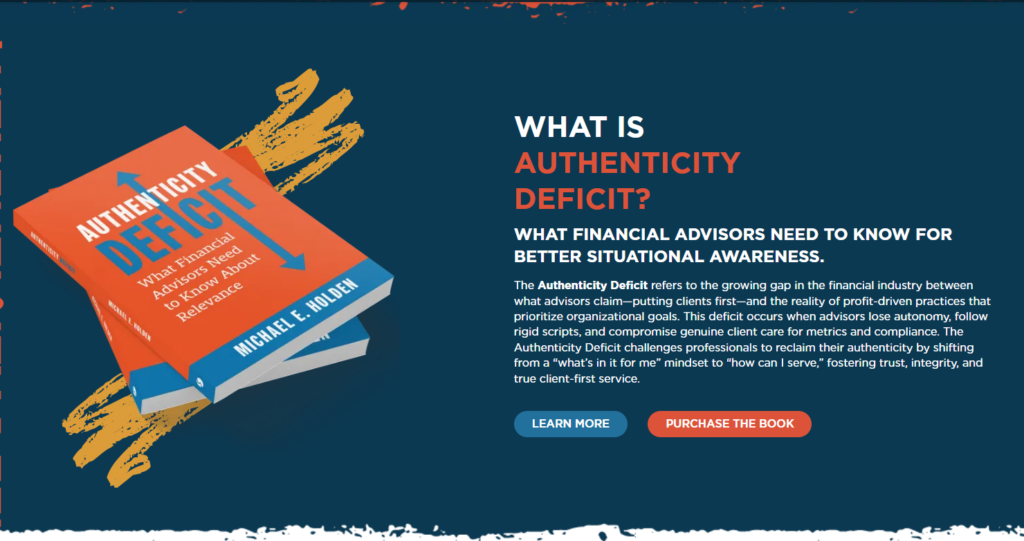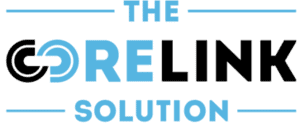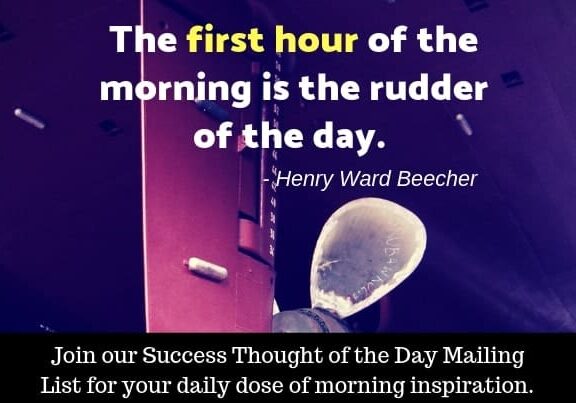Episode 147: Authenticity Deficit: A Deep Dive with Michael Holden
In a world where metrics often overshadow genuine care, the concept of authenticity has never been more critical. In a recent podcast episode, James sat down with Michael E. Holden, a seasoned financial executive and author of “The Authenticity Deficit: What Financial Advisers Need to Be Relevant Now.” Their conversation delved into the importance of…
Subscribe: iTunes | IHeartRadio | Spotify | Stitcher
In a world where metrics often overshadow genuine care, the concept of authenticity has never been more critical. In a recent podcast episode, James sat down with Michael E. Holden, a seasoned financial executive and author of “The Authenticity Deficit: What Financial Advisers Need to Be Relevant Now.” Their conversation delved into the importance of authenticity in both personal and professional realms, particularly within the financial services sector. Michael shared his professional journey, the inspiration behind his book, and emphasized the necessity of prioritizing standards of care over mere metrics across various industries. This blog post will break down the key insights from their discussion, offering actionable advice and thorough explanations to help you reflect on and enhance your authenticity.
Understanding the Authenticity Deficit What is the Authenticity Deficit? Michael E. Holden defines the authenticity deficit as the gap between what we claim to be and what we truly are. This concept is particularly relevant in the financial services industry, where professionals often prioritize metrics over genuine client care. However, the principles of authenticity apply to all aspects of life, from personal relationships to professional roles. The Inspiration Behind the Book Michael’s journey into financial services was deeply personal. After losing his father in his 20s, he realized the importance of financial planning. His mother, despite being a medical professional, struggled financially due to a lack of planning. This experience motivated Michael to help others avoid similar situations. Over time, he noticed a troubling trend: the emphasis on metrics often compromised the quality of care. This realization inspired him to write “The Authenticity Deficit,” aiming to encourage professionals to prioritize authenticity and quality of care over mere numbers. Key Insights and Actionable Tips 1. Embrace Silence and Self-Reflection Michael’s Advice: The greatest training room is the one where you’re alone with your thoughts. Embrace silence and be honest with yourself about your passion for your job and your motivations. Actionable Steps: Daily Reflection: Set aside 10-15 minutes each day for quiet reflection. Ask yourself questions like, “Am I genuinely passionate about my work?” and “Are my actions aligned with my values?” Journaling: Keep a journal to document your thoughts and feelings. This practice can help you identify patterns and areas where you may be compromising your authenticity. 2. Assess Your Authenticity Quotient (AQ) Michael’s Concept: The authenticity quotient measures the gap between self-serving actions and genuine service to others. Reflect on how authentically you’re serving others in both personal and professional contexts. Actionable Steps: Self-Assessment Test: Michael is developing a test with 25 questions to gauge your authenticity in various aspects of life. Take similar assessments available online to get a sense of your AQ. Feedback from Others: Seek feedback from trusted colleagues, friends, and family members about how authentic they perceive you to be. Use their insights to identify areas for improvement. 3. Prioritize Standards Over Metrics Michael’s Observation: In many industries, the focus on metrics can lead to a decline in quality of care. Professionals should prioritize maintaining high standards of care over merely meeting numerical targets. Actionable Steps: Quality Over Quantity: In your work, focus on delivering high-quality results rather than just meeting quotas. For example, if you’re in sales, prioritize building strong relationships with clients over just closing deals. Set Personal Standards: Define your own standards of excellence and hold yourself accountable to them, regardless of external metrics. 4. Align Your Role with Your Passion Michael’s Journey: After realizing he was living a life dictated by spreadsheets and metrics, Michael decided to pursue a deeper calling. He encourages others to assess whether their current roles align with their passions. Actionable Steps: Career Assessment: Regularly evaluate your job satisfaction and alignment with your passions. If you find a significant mismatch, consider exploring new roles or even starting your own business. Skill Development: Invest in developing skills that align with your passions. This can make it easier to transition to roles that are more fulfilling.  5. Foster Genuine Connections Michael’s Belief: Despite the rise of digitization, human connection remains essential, especially in fields like financial services. Clients seek advisors who listen and provide genuine value. Actionable Steps: Active Listening: Practice active listening in your interactions. Show genuine interest in others’ concerns and needs. Build Relationships: Focus on building long-term relationships rather than transactional interactions. This applies to both personal and professional contexts. Looking Ahead: The Future of Financial Services Michael predicts a significant shift toward digitization in wealth management. However, he emphasizes that human connection will always be crucial. As technology handles more tasks, the role of financial advisors will evolve to focus more on providing genuine value and building strong client relationships. Conclusion: Striving for Authenticity Michael E. Holden’s insights highlight the importance of authenticity in all aspects of life. By embracing silence, assessing your authenticity quotient, prioritizing standards over metrics, aligning your role with your passion, and fostering genuine connections, you can work towards becoming your most authentic self. Reflect on these tips and take actionable steps to enhance your authenticity in both personal and professional realms. For more insights, be sure to check out Michael’s book, “The Authenticity Deficit,” and take the authenticity quotient test when it becomes available. Let’s continue to encourage authenticity in our lives and the lives of those around us. What steps will you take to enhance your authenticity? Share your thoughts and experiences in the comments below. If you found this post valuable, don’t forget to subscribe to our blog for more insightful content.
5. Foster Genuine Connections Michael’s Belief: Despite the rise of digitization, human connection remains essential, especially in fields like financial services. Clients seek advisors who listen and provide genuine value. Actionable Steps: Active Listening: Practice active listening in your interactions. Show genuine interest in others’ concerns and needs. Build Relationships: Focus on building long-term relationships rather than transactional interactions. This applies to both personal and professional contexts. Looking Ahead: The Future of Financial Services Michael predicts a significant shift toward digitization in wealth management. However, he emphasizes that human connection will always be crucial. As technology handles more tasks, the role of financial advisors will evolve to focus more on providing genuine value and building strong client relationships. Conclusion: Striving for Authenticity Michael E. Holden’s insights highlight the importance of authenticity in all aspects of life. By embracing silence, assessing your authenticity quotient, prioritizing standards over metrics, aligning your role with your passion, and fostering genuine connections, you can work towards becoming your most authentic self. Reflect on these tips and take actionable steps to enhance your authenticity in both personal and professional realms. For more insights, be sure to check out Michael’s book, “The Authenticity Deficit,” and take the authenticity quotient test when it becomes available. Let’s continue to encourage authenticity in our lives and the lives of those around us. What steps will you take to enhance your authenticity? Share your thoughts and experiences in the comments below. If you found this post valuable, don’t forget to subscribe to our blog for more insightful content.
Holy Culture Radio is operated by The Corelink Solution, a non-profit organization that aims to create a safe space for healing, foster unity in our communities and empower the next generation of creatives and leaders through spreading the gospel.
If you’d like to support our work, please make a donation. No amount is too small. You can also shop our online store to help spread awareness of our mission. Again, thank you and remember to be encouraged and be blessed
TIMESTAMPS
Introduction to Authenticity (00:00:08) James introduces Michael E. Holden and the theme of authenticity in personal and professional contexts.
Michael’s Experience in Philadelphia (00:01:03) Michael shares his experiences visiting Philadelphia and its tourist attractions.
Michael’s Journey in Financial Services (00:02:10) Michael discusses his extensive experience in financial services and the motivation behind writing his book.
The Call to Write (00:02:53) Michael reflects on feeling called to write his book amidst personal and professional challenges.
Understanding Financial Services (00:03:33) Michael outlines his diverse background in financial services, detailing various roles he has held.
The Purpose of “Authenticity Deficit” (00:08:51) Michael explains the thesis of his book, focusing on quality of care versus metrics in financial services.
Authenticity Quotient Concept (00:10:07) Michael introduces the idea of the authenticity quotient, emphasizing its importance across all life aspects.
Cultural Influences on Authenticity (00:11:16) James and Michael discuss the gap between serving others and serving oneself in professional contexts.
Metrics vs. Standards in Healthcare (00:12:53) Michael compares the impact of metrics on standards in healthcare and other sectors, highlighting authenticity issues.
Observations Leading to Action (00:15:18) Michael shares insights on what prompted him to address the authenticity deficit in financial services.
Personal Connections in Leadership (00:17:12) Michael emphasizes the importance of personal connections and understanding team members in leadership roles.
The Shadow of Inauthenticity (00:18:47) Michael reflects on the consequences of standing by while witnessing inauthentic practices in the workplace.
Self-Assessment and Honesty (00:22:19) Discusses the importance of self-assessment and being honest about one’s passion and skills.
The Calling and Personal Reflection (00:24:29) Explores the feeling of a personal calling and the significance of silence for reflection.
Authenticity and Community Impact (00:25:07) Highlights sharing personal experiences to inspire change within families and communities.
Counting the Cost of Authenticity (00:28:03) Michael reflects on the sacrifices made while pursuing authenticity and writing his book.
Authenticity Quotient Test Introduction (00:30:05) Introduction of a new test to assess personal authenticity and its implications.
Investment in Self-Discovery (00:31:47) Discusses the depth of thought required for the authenticity assessment and its potential impact.
Future of Financial Services (00:35:26) Speculates on the digitization of wealth management and the enduring need for human connection.
Empowering Personal Growth (00:37:35) Michael expresses hope for people to assess their fulfillment and reclaim their energy and authenticity.
Introduction and Gratitude (00:40:03) James expresses humility and gratitude towards Michael, acknowledging the challenges of answering one’s calling.
Reflection on Authenticity (00:40:12) Michael emphasizes the comfort found in being authentic and making the best use of one’s time.
Closing Remarks (00:40:22) James thanks Michael for the insightful episode and expresses appreciation for their time together.
Invitation for Feedback (00:40:24) James encourages listeners to share their thoughts and feedback on the episode for collective growth.







